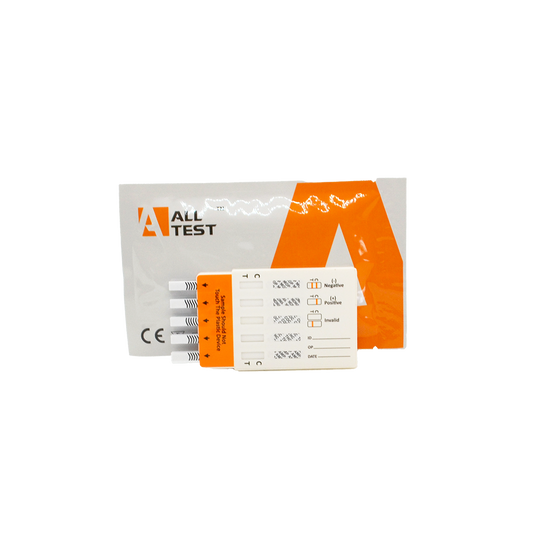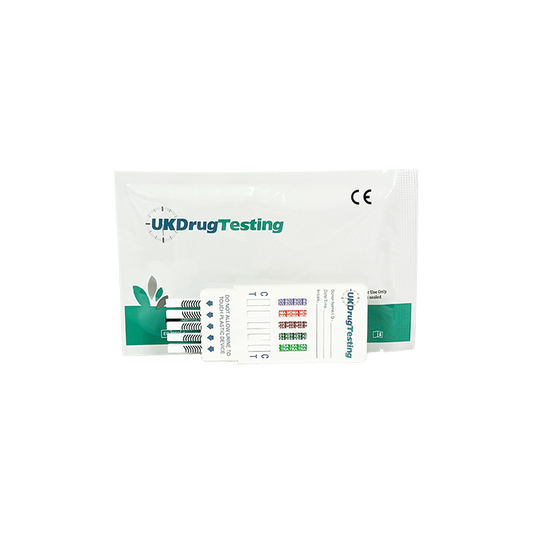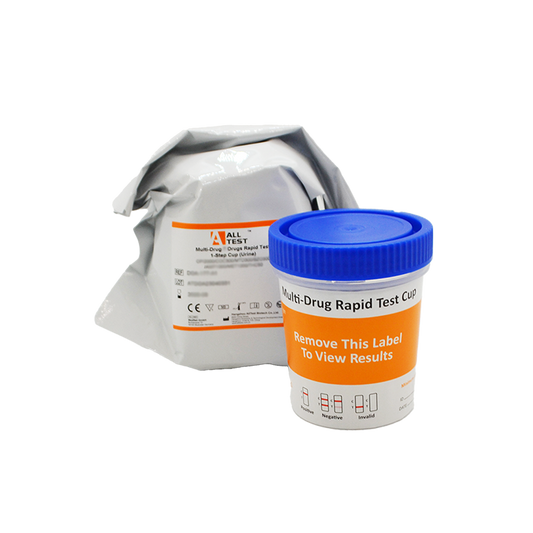Best drug tests for Ketamine
Special K drug tests
-
Urine Multi Drug Panel (ALLTEST) Party (4 Drugs) ⛛ / 1 Test
Regular price £2.80 GBPRegular priceUnit price per -
Urine Multi Drug Panel (ALLTEST) Club (7 Drugs) / 1 Test
Regular price £3.45 GBPRegular priceUnit price per -
Urine Multi Drug Panel (ALLTEST) Workplace (10 Drugs) / 1 Test
Regular price £4.16 GBPRegular priceUnit price per -
Urine Multi Drug Panel (ALLTEST) Streetside (10 Drugs) / 1 Test
Regular price £5.25 GBPRegular priceUnit price per

KET - Ketamine
UK Class B Illegal Drug
Ketamine is increasingly emerging as a substance of concern in the United Kingdom, both for its illicit recreational use and its growing application in medical treatment. Medically, ketamine may be prescribed by the NHS or licensed private practitioners, typically for treatment-resistant depression or severe pain management, and only under strict clinical protocols.
Although international research and shifting attitudes have led to some discussion around the potential for broader therapeutic use of ketamine, decriminalisation is not currently a mainstream political stance in the UK. Even if regulatory changes were to occur, ketamine would still be tightly monitored and subject to drug testing, much like alcohol, due to its dissociative effects and significant impact on cognitive and motor functions.
Appearance
What does ketamine look like?
Ketamine is available in both liquid and solid forms. Veterinary-grade ketamine is typically stored as a liquid in small vials. When prepared for illegal use, the liquid is often evaporated commonly using a microwave leaving behind a crystal-like powder that resembles small glass shards.
Absorption
How long does it take to feel the effects of ketamine?
Absorption of KET, the main active ingredient in ketamine, will vary between individuals as with any consumed drug, but here is a general guide.
- When Snorted (5 - 15 Minutes)
- When Gummed (15 - 30 Minutes)
Duration
How long do the effects of Ketamine last?
As with most psychoactive substances, ketamine has a period where its effects are most intense referred to as the peak. The timing and intensity of this peak depend on factors such as dosage, route of administration, individual metabolism, and setting. The following provides a rough guide:
- When Snorted (20-40 Minutes)
- When Gummed (30 - 60 Minutes)
Metabolism
How long is Ketamine use detectable in the body?
KET can be detected on a drug test for the following times:
- Urine (3 - 5 days)
- Saliva (48 - 72 Hours)
- Blood (24 - 48 Hours)
- Hair (Up to 90 Days)
Other common names for Ketamine
Frequently asked questions about Ketamine
Why do people consume Ketamine?
Recreational Use
Ketamine provides dissociative and hallucinogenic effects which provide short term enjoyment for recreational users. Its cheap cost and potent effects make it an ideal party drug.
Medical Use
Ketamine can be used to treat depression, with many studies ongoing for extended usage of microdosing ketamine.
Is Ketamine dangerous?
Yes, ketamine can be dangerous. While generally overdosing on ketamine is not a high risk, people under the influence are able to harm themselves by accident due to the strong sedative nature coupled with alcohol, users are likely to perform more idiotic actions and have less concern for safety
Additionally, ketamine has several long-term effects that are less a matter of possibility and more a matter of certainty with prolonged use. The most well-known is the weakening and deterioration of the pelvic muscles, which can lead to loss of bladder control and a need for external medical assistance.
Is Ketamine addictive?
Ketamine is not chemically addictive, however users can become psychologically dependant on the drug and its effects (In sense becoming addicted to the feeling).
Identifying the signs of Ketamine use
White powder around the nostrils or damage to the nasal passage.
More frequent bathroom usages.
Should i drug test for Ketamine?
Workplace
Yes, In the UK, ketamine is classified as a Class B drug under the Misuse of Drugs Act 1971. Possession, production, or supply is illegal except in specific cases involving medical cannabis, which is tightly regulated. Employers have the right to maintain a drug-free workplace and are legally obligated to ensure the safety of their employees under the Health and Safety at Work Act 1974. The effects of ketamine are extreme so it is paramount that employees are not under the influences of ketamine while at work.
Home
We recommend considering at-home testing for ketamine. The drug is increasingly common in nightclubs and pubs, making it more accessible particularly to younger individuals. Because ketamine is less widely understood than substances like cocaine, peer pressure may be more effective, as many people are unaware of the potential harm ketamine can cause.
Ketamine Drug Information - dtk
Last Updated 20/05/2025
Ketamine Drug Tests
Drug tests for ket
-
Urine Multi Drug Panel (ALLTEST)
Regular price From £2.80 GBPRegular priceUnit price per -
Urine Multi Drug Panel (UKDrugTesting)
Regular price From £2.75 GBPRegular priceUnit price per -
Urine Multi Drug Cup (ALLTEST)
Regular price From £6.50 GBPRegular priceUnit price per -
Urine Drug Test Strips
Regular price From £4.99 GBPRegular priceUnit price per£14.99 GBPSale price From £4.99 GBPSale





